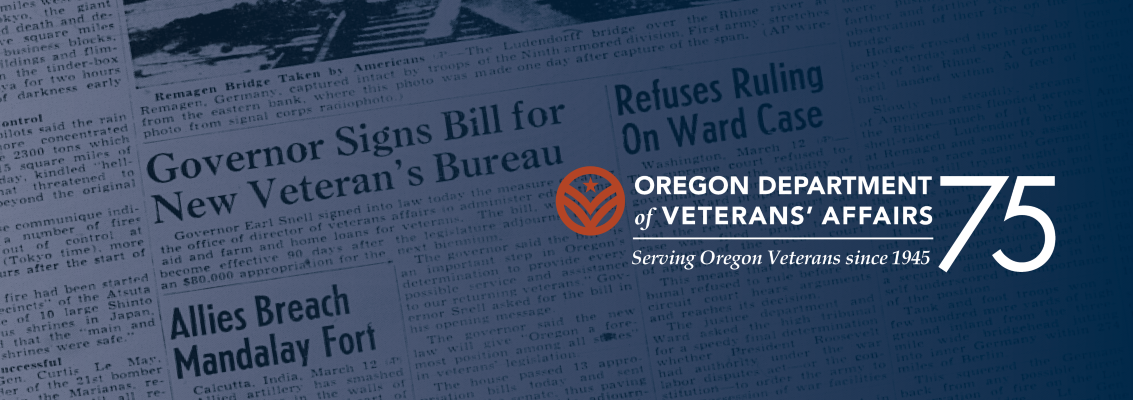
1945 - 2020: A Legacy of Dedication to Oregon Veterans
The Oregon Department of Veterans' Affairs was founded in 1945, but Oregon's pioneering advocacy for its veterans traces its roots much further back. From our vantage point in 2020, we reflect upon and honor the legacy of those who paved the way to ensure Oregon's dedication to its veterans continues for a long time to come.
The "Bonus Army" Marches
After the end of World War I, in an effort to restore economic balance, Congress passed the World War Adjusted Compensation Act of 1924, promising veterans additional compensation to make up for wages lost during military service. The amount was based on length and location of service; if the amount due was greater than $50, veterans were issued endowment certificates payable in 20 years.
This meant that originally, many veterans' compensation - popularly known as "bonuses" - was not due to be paid until 1945. In the height of the Great Depression, demand grew for Congress to pay the bonuses in cash and in full, immediately. An early leader of the new "Bonus Army" movement was 34-year-old Oregon native and former sergeant Walter W. Waters, whose rhetoric put Portland on the map as the epicenter of the cause.
Oregon Enters the Bonus Army Movement
In 1932, Waters promoted the idea of a veterans' march on Washington that was echoed up and down the West Coast. As support grew, so did the ranks of recruits in the new Bonus Expeditionary Force. Men traveled from as far away as California to join Waters in Portland, and his Bonus Expeditionary Force gained national press coverage as it ventured east that spring.
Once in Washington, they joined other BEF contingents from all across the country, totaling between 15,000 and 40,000 men, and camped along Pennsylvania Avenue with the intent to stay until Congress passed a bonus bill to grant the payments. Waters staged daily demonstrations and peaceful marches but could not gain an audience with President Hoover.
"We’ll stay here until the bonus bill is passed, ’till 1945, if necessary."
- Walter Waters
The movement turned sour after Congress failed to pass legislation that summer. It would take until 1936 for Congress to authorize payment of the bonuses, after the first Bonus March ended in violence against the veterans' encampment and a second Bonus March was established to carry on the cause.
.jpg) Bonus Expeditionary Forces camp in Washington, D.C. in 1932. Photo courtesy Wikimedia Commons.
Bonus Expeditionary Forces camp in Washington, D.C. in 1932. Photo courtesy Wikimedia Commons.
Legacy of the Bonus Army
The Bonus Army's efforts and bitter treatment by the Hoover administration revealed serious shortcomings in the way America cared for its returning veterans. The resulting legacy of the Bonus March culminated in the
Servicemen's Readjustment Act of 1944. More commonly known as the GI Bill of Rights, this legislation paved the way to ease the transition from military to civilian life for the 16 million veterans returning from World War II.
Veteran Advocacy in World War II
Oregon's World War I veterans were determined to do right by the new veterans returning home in the early 1940s. Then-Governor Snell recognized their strong enthusiasm and called for the organization of area interest groups by forming the Portland general committee on services to veterans in 1944. Their purpose was to "promote in every feasible manner the coordination of agencies and organizations with the state and federal agencies dealing with war veterans to the end that the veterans and their dependents may receive not only their rights under law, but the fullest possible meeting of our obligation to those who have borne arms for us."
Complementing this effort, Oregonians rallied together to vote into Oregon's constitution a farm and home loan program for veterans. To this day, Oregon is one of only a handful of states that is able to directly provide a home loan benefit to its resident veterans. The state also offered educational aid to help returning service members pursue advanced degrees.